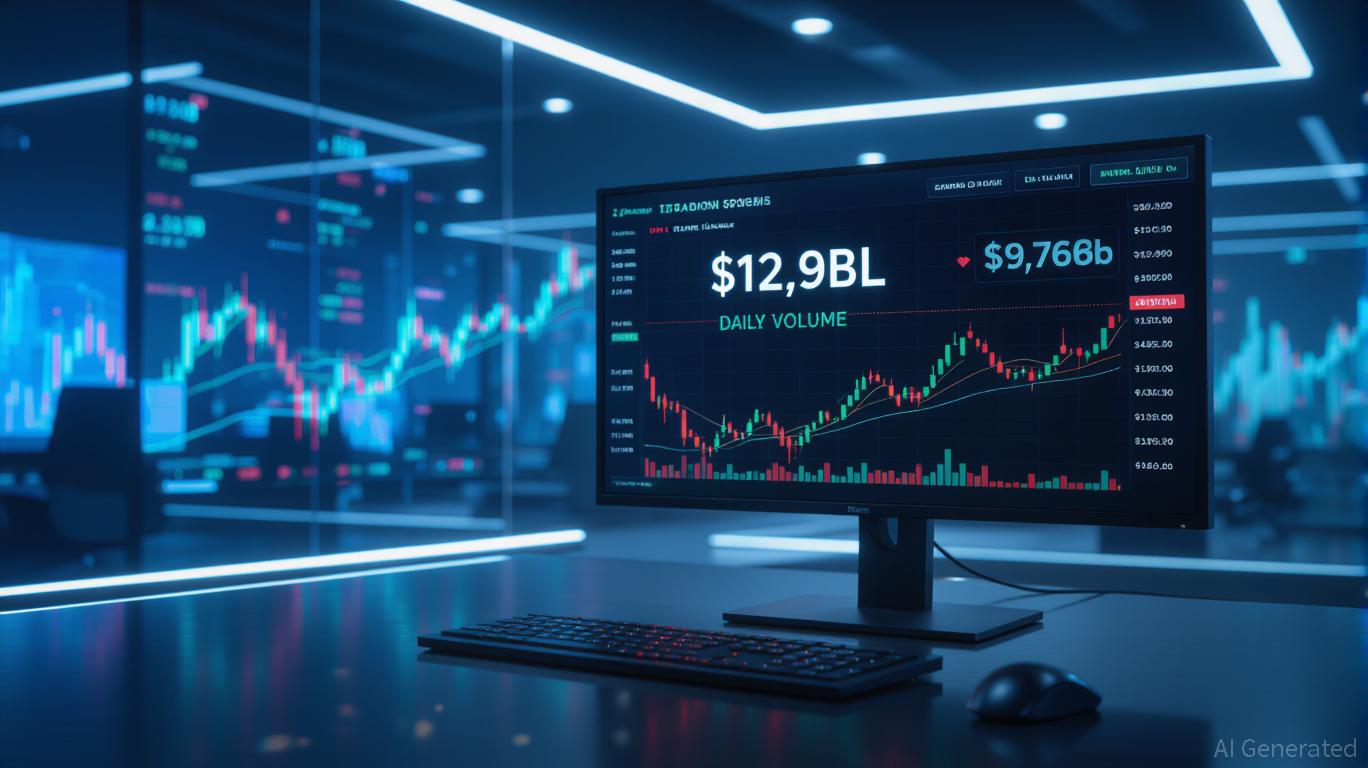Google’s adoption of AI confirms that prediction markets are recognized as credible instruments in the financial sector
- Google Finance integrates real-time prediction market data from Kalshi and Polymarket via AI, enabling users to access event odds on economic indicators and sports outcomes. - Kalshi and Polymarket reported record $4.4B trading volume and 477K active traders in October, reflecting growing legitimacy of prediction markets beyond gambling associations. - Regulatory challenges persist as state authorities question Kalshi's sports betting legality, while CFTC adopts a more open stance toward prediction marke
Google Finance has introduced a new AI-driven feature that brings live prediction market data from Kalshi Inc. and Polymarket into its platform, representing a notable move into the realm of event-based forecasting, according to an
Both Kalshi and Polymarket have experienced rapid expansion recently, fueled by their regulated sports betting offerings and broader event prediction services, according to an

This collaboration also brings regulatory challenges to the forefront. Kalshi is licensed by the U.S. Commodity Futures Trading Commission (CFTC) as a federally regulated exchange, but state authorities in Maryland, New Jersey, and elsewhere have objected to its sports betting products, claiming they breach current gaming regulations, according to iGaming Business. Polymarket, which recently resumed operations in the U.S. after a 2022 CFTC enforcement action, faces comparable regulatory scrutiny. Despite these obstacles, the CFTC has indicated a more favorable view of prediction markets as sources of information, a development that could facilitate future growth, as noted in a
For individuals using the platform, this integration provides a novel approach to financial analysis.
Industry experts see this development as an endorsement of prediction markets’ practical value. Bernstein analysts observed that services like Kalshi and Polymarket are evolving from specialized gambling sites into mainstream information platforms covering politics, economics, and culture, as reported by The Block. Other companies, including Robinhood and MetaMask, are also entering the field—Robinhood has teamed up with Kalshi for sports betting contracts, while MetaMask is preparing to add Polymarket for decentralized prediction trading.
This integration reflects a wider movement in traditional finance toward adopting decentralized and crowd-sourced data. As prediction markets become more popular, they are increasingly viewed as supplements to conventional polling and financial forecasting, providing immediate, market-based perspectives, a point also mentioned by Investing.com. Nevertheless, regulatory uncertainty persists, with ongoing legal disputes at both state and federal levels regarding the legality of sports betting contracts.
Disclaimer: The content of this article solely reflects the author's opinion and does not represent the platform in any capacity. This article is not intended to serve as a reference for making investment decisions.
You may also like
Hyperliquid's Rapid Rise: Emerging as a Major Player in Decentralized Trading?
- Hyperliquid captures 73% of decentralized perpetual trading volume with $12.9B daily trading and $9.76B open positions in October 2025. - Platform executes $645M HYPE token buybacks (46% of crypto buybacks) while 62.26% of Arbitrum's USDC liquidity flows to Hyperliquid. - Institutional adoption grows with 21Shares proposing SEC-approved HYPE ETF, while HIP-3 protocol enables permissionless market creation via HYPE staking. - Faces competition from new rivals (Aster, Lighter) and leadership risks, but exp

Bitcoin News Today: Is Bitcoin’s Recent Sell-Off Driven by Corporate Debt Reduction or Market Manipulation?
- Bitcoin fell below $100,000 on Nov. 4, 2025, with $1.3B in liquidations as whales and firms like Sequans sold BTC to reduce debt. - Analysts argue sellers may amplify bearish narratives via social media to profit from lower prices, while corporate treasury strategies face risks amid falling prices. - On-chain data shows moderate unrealized losses (3.1% stress level), suggesting potential stabilization, though some warn a $56,000 cascade could follow a $100,000 break. - Diverging strategies emerge: Americ

"Study Reveals 25% of Polymarket's Trading Volume is Artificial Due to Ghost Trades"
- Columbia University study reveals 25% of Polymarket's trading volume may involve wash trading, where users self-trade to inflate activity. - Sports and election markets showed highest manipulation rates (45% and 17% fake volume), peaking at 95% in election markets in March 2025. - Platform's lack of transaction fees and pseudonymous wallets enabled manipulation, despite CFTC regulatory actions since 2022. - Researchers urge Polymarket to adopt their detection methods to exclude fraudulent wallets and res

DeFi's Inherent Risks Prompt a Governance Overhaul
- Curve community proposes halting CRV token emissions to Elixir pools amid deUSD collapse linked to Stream Finance's $93M loss. - Elixir's synthetic stablecoin lost 98% value after 65% collateral tied to Stream's devalued xUSD, triggering liquidity freezes and legal disputes. - DeFi platforms like Suilend and Euler forced debt repayments while Stream's 90% deUSD control blocks resolution, exposing systemic governance flaws. - Industry warns interconnected stablecoins and opaque fund managers pose $3.1B an
